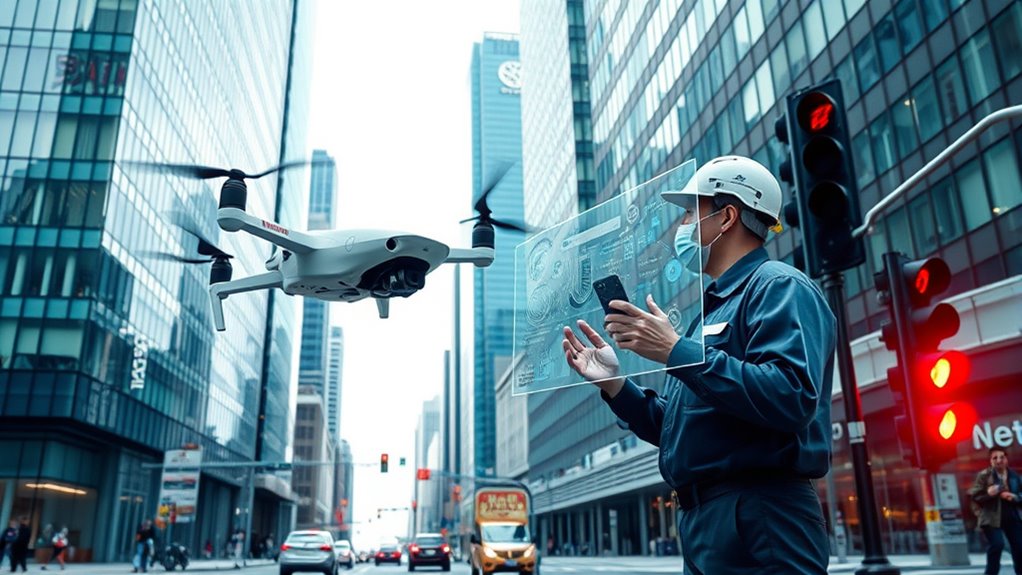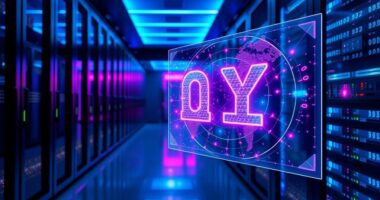AI operates across industries by automating tasks, personalizing experiences, and improving efficiency. In healthcare, it helps diagnose and predict health outcomes. In finance, AI assesses risks and enhances customer service. Manufacturing uses AI to optimize production lines. In daily life, virtual assistants, streaming services, and smart home devices rely on AI to make tasks easier. As AI continues evolving, you’ll discover even more ways this technology shapes both work and daily moments.
Key Takeaways
- AI enhances industry operations through automation, data analysis, and personalized services in sectors like healthcare, manufacturing, and finance.
- In daily life, AI powers virtual assistants, personalized content recommendations, and smart home devices for improved convenience.
- AI-driven tools improve diagnostics, treatment plans, and predictive analytics in healthcare and education sectors.
- AI enables autonomous vehicles, traffic management, and energy-efficient home automation systems for safer, sustainable living.
- AI market growth fuels investment in innovative applications, transforming how industries operate and individuals interact daily.

Have you ever wondered how artificial intelligence is transforming the world around you? AI has become an integral part of various industries and daily activities, changing how we work, learn, and connect. In industries like IT and telecommunications, nearly 38% of organizations plan to adopt AI by 2025, streamlining operations and improving service delivery. Healthcare is experiencing a similar surge, with 38% of medical providers using AI for diagnosis, personalizing treatments, and predicting patient outcomes. Manufacturing is also embracing AI, enhancing production lines and optimizing supply chains, leading to faster turnaround times and reduced costs. Financial services leverage AI to assess risks more accurately and offer better customer service, while education platforms utilize AI-driven tools to personalize learning experiences, catering to each student’s unique needs. Additionally, AI can significantly improve color accuracy in projectors, enhancing the visual experience in home cinema setups.
AI is transforming industries like healthcare, manufacturing, finance, and education with personalized solutions and increased efficiency.
In your daily life, AI influences many of your routines without you even realizing it. Virtual assistants like Alexa and Google Assistant help you manage your schedules, control smart home devices, and answer questions instantly. Streaming platforms such as Netflix use AI algorithms to analyze your viewing habits, providing personalized recommendations that keep you glued to your favorite shows—generating over a billion dollars annually from these suggestions alone. AI also plays a role in home automation, enabling smart devices to work seamlessly together for increased energy efficiency and convenience. Wearables monitor your health data, offering insights into your fitness progress or alerting you to potential health issues, while autonomous vehicles and traffic management systems rely on AI to make transportation safer and more efficient. Global AI Market Value is projected to reach approximately $391 billion in 2025, reflecting the rapid growth and investment in this technology.
AI’s impact extends into marketing and sales, where 71% of organizations now use generative AI to craft targeted campaigns, generate social media content, and develop advertisements. Deep customer insights from AI help businesses tailor their offerings, predict market trends, and improve sales strategies. Customer service has also been transformed by AI-powered chatbots, which handle inquiries swiftly and efficiently, freeing human agents for more complex tasks.
Your job landscape is evolving as well. AI enhances human productivity in many roles but also automates repetitive tasks, leading to shifts in employment. Workers with AI skills often command higher wages, and industries leveraging AI experience faster revenue growth. In education and training, AI personalizes learning experiences, supports virtual environments, and helps identify skills that need development. It also improves accessibility for students with disabilities, ensuring more inclusive learning environments.
The healthcare sector benefits from AI in diagnostics, personalized medicine, and predictive analytics, making treatments more precise and proactive. The global AI market, valued at around $391 billion in 2025, continues to grow rapidly, with investments rising considerably. As AI advances, it’s reshaping industries and daily life, making tasks easier, smarter, and more efficient—showing just how deeply this technology is embedding itself into the fabric of your world.
Frequently Asked Questions
How Does AI Impact Job Security Across Different Sectors?
AI impacts your job security differently across sectors. In manufacturing and tech, it risks displacing many workers, leading to layoffs and longer recovery times. However, in healthcare and financial services, AI drives transformation rather than displacement, creating new roles and requiring you to upskill. You’ll need to adapt continuously, as AI’s influence grows, but opportunities also emerge for those willing to learn and embrace new skills.
What Are the Ethical Concerns Related to AI Deployment?
You should be aware that ethical concerns in AI deployment include bias and discrimination, which can lead to unfair outcomes. Privacy and data protection are essential, as misuse can harm individuals. Ensuring transparency and explainability helps build trust, while accountability is critical for responsible use. Balancing innovation with regulation is necessary to prevent harm, promote safety, and guarantee AI benefits society without compromising ethical standards.
How Is AI Regulation Evolving Worldwide?
You’ll see AI regulation evolving globally with countries adopting different approaches. The EU leads with strict rules under the AI Act, banning high-risk AI and demanding transparency and oversight. Meanwhile, the US favors voluntary guidelines to promote innovation, and China enforces strict, binding rules on data and deepfakes. Many nations are adopting frameworks inspired by international standards, but overall, regulation remains fragmented, emphasizing risk management, accountability, and transparency across industries.
Can AI Systems Develop Biases Over Time?
Remember when AI was just a sci-fi dream? Now, it can develop biases over time if left unchecked. You might not realize it, but ongoing interactions and outdated data feed into these biases, making AI systems unfair or prejudiced. By continuously monitoring and updating these models, you can help prevent bias from intensifying, ensuring AI remains fair and accurate as it learns and adapts in your industry or daily life.
What Are the Future Trends in AI Technology?
You’ll see AI becoming more specialized, capable of handling complex tasks like coding and reasoning across industries. Action-based AI systems will autonomously make decisions and act in real-world settings, transforming workflows. Workforce roles will shift, requiring new skills in AI integration. Emerging technologies like real-time AI, enhanced transparency, and robotics will reshape daily life and industries, making AI more intuitive, autonomous, and impactful by 2030.
Conclusion
As you navigate your daily life, AI is like a silent partner weaving itself into every thread of your routine. From helping you find your way with smart maps to customizing your favorite playlists, AI acts as a guiding compass. It’s easy to overlook, but its presence is like an invisible thread, connecting industries and your personal world seamlessly. Embracing AI means stepping into a future where technology becomes your trusted co-pilot, shaping your journey every step of the way.









